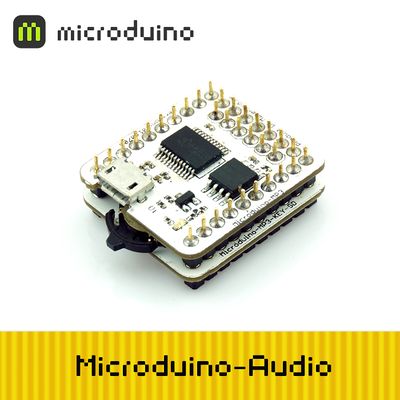Difference between revisions of "Microduino-Module Audio"
From Microduino Wiki
| Line 42: | Line 42: | ||
*Dial wheel button control | *Dial wheel button control | ||
**Hardware needed: [Microduino-Core+]], [[Microduino-USBTTL]],[[Microduino-Amplifier]], Microduino-Audio, Audio-KEY-SD, two loudspeakers and power supply (1A or higher) or [[Microduino Extension Boards]]; | **Hardware needed: [Microduino-Core+]], [[Microduino-USBTTL]],[[Microduino-Amplifier]], Microduino-Audio, Audio-KEY-SD, two loudspeakers and power supply (1A or higher) or [[Microduino Extension Boards]]; | ||
| − | **Connect your PC with Microduino-Audio and write audio file into flash, which can refer to document | + | **Connect your PC with Microduino-Audio and write audio file into flash, which can refer to document structure; |
**Stack Audio-KEY-SD. Meantime, Microduino-Audio's microUSB interface is not directly connected with the computer. You need to change another power supply so as not to recognize the driver and fail to play music. Please make sure the current should be 1A or higher, otherwise, it may cause music play failure due to undercurrent. Or you can use microUSB on Microduino extension module to supply power. | **Stack Audio-KEY-SD. Meantime, Microduino-Audio's microUSB interface is not directly connected with the computer. You need to change another power supply so as not to recognize the driver and fail to play music. Please make sure the current should be 1A or higher, otherwise, it may cause music play failure due to undercurrent. Or you can use microUSB on Microduino extension module to supply power. | ||
**Start Arduino IDE and open example program. | **Start Arduino IDE and open example program. | ||
| Line 67: | Line 67: | ||
**Select Microduino Core+ (Atmega644P@16M,5V) as the board cad, download to core board with Microduino-USBTTL after compiling; After the download, dial the wheel left and right, you can choose the music. | **Select Microduino Core+ (Atmega644P@16M,5V) as the board cad, download to core board with Microduino-USBTTL after compiling; After the download, dial the wheel left and right, you can choose the music. | ||
| − | *Serial port | + | *Serial port structure controls music from memory card. |
**Connect Microduino-Audio to your PC with USB cable, you can find two disks including one MP3's flash and one memory card. | **Connect Microduino-Audio to your PC with USB cable, you can find two disks including one MP3's flash and one memory card. | ||
**Open memory and create a folder, which has to be named among the range of 01, 02…………99. Save music into this newly created folder and name the music file among the range of 001, 002,003………999. | **Open memory and create a folder, which has to be named among the range of 01, 02…………99. Save music into this newly created folder and name the music file among the range of 001, 002,003………999. | ||
Latest revision as of 04:03, 4 August 2017
| Language: | English • 中文 |
|---|
|
Microduino-Audio is the audio play module based on JQ6500 serial port MP3 chip, which together with Audio-KEY-SD can play flash music by thumbwheel switch control and with Microduino core module can send serial port commands to control the system.
ContentsFeatures
Specification
DocumentJQ6500 sound chip description: File:JQ6500.pdf Development
Program description: "arduino.h" is audio control file. 1. Under default serial port, you can select serial port in "arduino.h" based on your core module. #define AUDIO_PORT Serial1 //Core+
//#define AUDIO_PORT mySerial //Core2. Initialize Audio module and you can choose where to start the music. #define DEVICE_Flash 5
#define DEVICE_TF 1If you want to play Flash, please initialize: audio_init(DEVICE_Flash,MODE_loopOne,music_vol); 3. Initialize Audio module and choose play mode. #define MODE_loopAll 0
#define MODE_loopOne 1
#define MODE_One_STOP 2
#define MODE_One_END 4
ApplicationMicroduino-Audio is widely used in various kinds of voice broadcast:
PurchaseHistoryPictureFrontFile:Microduino-Audio-F.JPG Microduino-Audio Front BackFile:Microduino-Audio-b.JPG Microduino-Audio Back Video |
